What people say about your brand on the internet plays a significant role in the ever-evolving digital era, where information is just a click away.
We won’t be overstating if we say that a brand’s online reputation can make or break it, irrespective of how good the products/services are.
Therefore, in this blog, we will delve into the intricacies of what reputation marketing entails and why it holds a pivotal role in the success of businesses today.
What is Reputation Marketing?
Beyond the conventional definition of reputation management, there is reputation marketing. Reputation marketing adopts a proactive stance, whereas reputation management entails keeping an eye on and responding to internet reviews and remarks. Improving a brand’s image entails actively molding and influencing how the public perceives the company.
The main goal of reputation marketing is to create a positive public perception of a company by utilizing its positive attributes and customer interactions. It includes techniques to use various platforms, including social media, online reviews, and content marketing, to highlight a brand’s advantages, core values, and pleased customers.
In addition to responding to criticism, this proactive approach aggressively promotes and highlights endorsements, success stories, and favorable reviews. Reputation marketing seeks to build a clear narrative around the business, influencing potential buyers and strengthening brand loyalty through the purposeful management of online presence and interaction with the target population.
Reputation marketing is a thorough and deliberate method of building a favorable brand image, encouraging client trust, and eventually promoting business success in the digital sphere.
Importance of Online Reputation Management
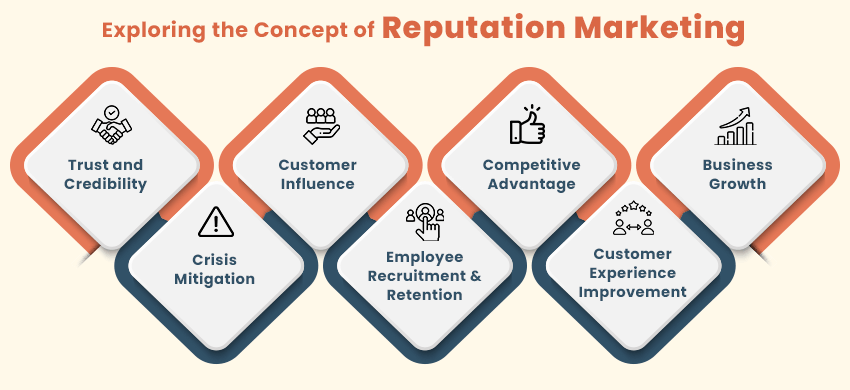
The importance of online reputation management definition can’t be stressed enough in today’s digital age. Here are key reasons why it holds a pivotal role for businesses
1. Trust and Credibility
A positive online reputation definition is building trust among potential customers. In a digital landscape where consumers have many choices, they are more likely to engage with a brand they perceive as trustworthy. Positive reviews, testimonials, and a solid online presence contribute significantly to establishing credibility.
Customers look for social proof from other customers and testimonials are a great way to repel doubts. By including more online reviews from platforms like Trustpilot, g2, Yotpo, Review.io, etc.,shows your customers trust you. Imagine being a business with over 100 reviews compared to that with just 2 reviews. Aim to note every customer’s experience to build a solid online presence.
2. Customer Influence
Consumers nowadays rely on online reviews and ratings to inform their purchasing decisions. Positive reviews are powerful endorsements, influencing potential customers to choose your products/services over competitors. Conversely, negative reviews can deter prospects, highlighting ORM’s crucial role in shaping consumer perceptions.
Customers are influential brand advocates: both positive and negative. It may not be possible to have 100% positive experiences but more positives can drown out negatives. Showcasing some of your loyal customers repeatedly can also work out well for your business.
3. Competitive Advantage
In a competitive market, a positive online reputation sets a business apart. Potential customers who compare similar products or services often turn to online reviews and reputation to make decisions. A business with a stellar reputation gains a competitive edge, attracting customers who prioritize reliability and positive experiences.
While replying to your customers positive and negative feedback, you can emphasize on your business’ strengths and unique business points. Mentioning what makes your business different and better when replying can attract new customers too. It’s a good practice to bring attention to your accomplishments and certifications that may put you ahead of your competition.
4. Business Growth
Satisfied customers become brand advocates, spreading positive word-of-mouth. This organic marketing can lead to increased customer acquisition and business growth. A solid online reputation contributes to a positive feedback loop where satisfied customers attract new ones, fostering sustainable expansion.
Why not highlight your significant business milestones? Portraying your small wins and achievements in ORM brings positivity and signifies forward movement. Add business growth to your marketing communications and share your success with your customer and prospects to display a quest for growth.
5. Crisis Mitigation
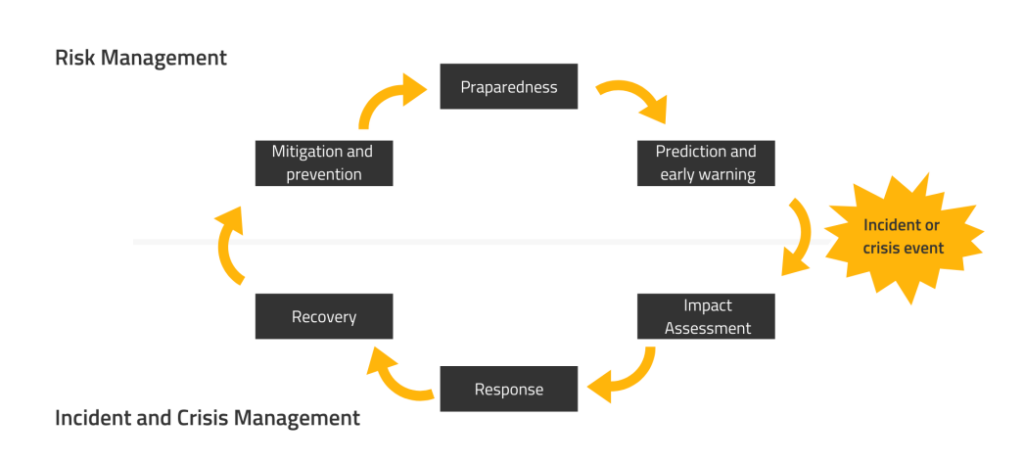
Image source:- kognitivspark.com
Online reputation management is crucial for handling negative situations effectively. Addressing and resolving customer concerns promptly can prevent the escalation of issues and mitigate potential damage to a brand’s reputation. ORM provides businesses the tools to navigate crises and maintain a positive image during challenging times.
Part of your contingency plans is handling difficult situations with ease. ORM helps you win time if there is a need for damage-control and seamlessly transition back to normal operations.
6. Employee Recruitment and Retention
A positive online reputation extends beyond customers to potential employees. Job seekers often research a company’s reputation before applying, and employees may contribute to a positive online image through their reviews and testimonials. A strong employer brand, facilitated by ORM, aids in attracting and retaining top talent.
An employer that’s quick in their responses to enquiries makes themselves inviting to quality talents. Acknowledging brand mentions from new joinees or on longevity awards for milestones completion can go a long way to attracting new employees or retaining existing ones.
7. Customer Experience Improvement
Regularly monitoring online feedback allows businesses to identify improvement areas in their products or services. Constructive customer criticism provides valuable insights, enabling businesses to enhance the overall customer experience and, in turn, strengthen their reputation.
Businesses must be aware of all mentions on popular platforms like X(Twitter), Facebook, Instagram and others. Not all users report positive and negative experiences online. A trial, a passing mention or a food for thought can prompt people to @ your brand on a social platform.
Responding to a user following your branding guidelines is important to maintain consistency.
How do you build and manage a brand’s online reputation?
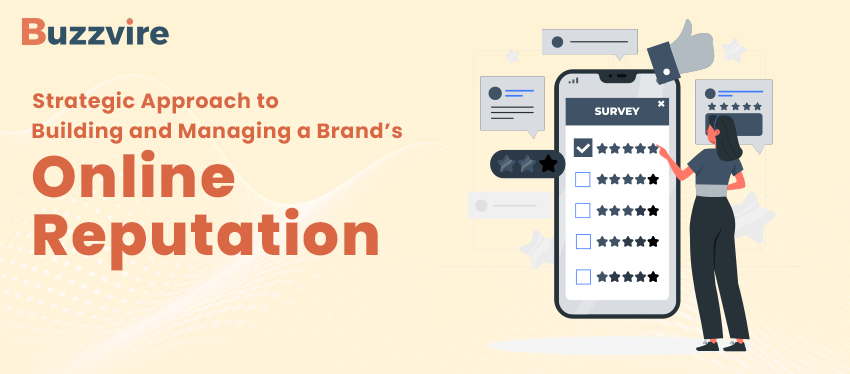
Building and managing your brand’s online reputation requires a strategic and proactive approach. Here are some essential steps to develop and maintain a positive online image effectively.
1. Monitor Online Presence
Regularly monitor various online platforms, including social media, review sites, forums, and news articles, to stay informed about what is being said about your brand. Utilize tools like Google Alerts to receive notifications whenever your brand is mentioned online.
Social Mention is another third-party tool that monitors your brand reputation, sentiments and popularity. SEMrush provides useful data like Measure your estimated reach, track referral traffic from mentions, identify mention sentiment, analyze mentioning resource authority.
2. Engage with Customers
Actively interact and engage with the audience on social media and other platforms and respond promptly to customer reviews, both positive and negative. Acknowledge positive feedback to show appreciation, and address negative comments with empathy and a commitment to resolving issues. Transparent and responsive communication builds trust.
Today, the digital world is ripe with AI tools to manage your customer queries and servicing. Attend your customers with AI-powered tools that include a ticketing system, knowledge base, and live chat.
3. Encourage Reviews

Encourage customers to give reviews on sites, social media, and your website. A higher volume of positive reviews enhances your online reputation and counterbalances occasional negative feedback.
You are what your customers say you are. Collecting reviews from the most recent positive experience is an apt moment to understand your customers’ emotion towards your service.
4. Content Marketing
Create and share valuable content that reflects your brand’s identity and values. It could include blog posts, articles, videos, and social media updates. Consistent and positive messaging reinforces your brand image and promotes a favorable online reputation.
Maintaining a consistent tone of voice and messaging across platforms and keeps your brand true to its beliefs. Some brands prefer to use a bit of humor over a complete formal tone. Whatever tone you choose, ensure your interactions follow an agreed tone to keep your customers clear about your brand’s identity.
5. Consistency Across Platforms
Maintain the same brand image across all platforms. Use the same logos, brand colors, and messaging to create a cohesive and recognizable identity. Consistency fosters trust and helps customers quickly identify and connect with your brand.
6. Proactive Issue Resolution
Address negative feedback proactively and constructively. Respond to customer concerns with a commitment to resolving issues. Publicly addressing and resolving problems showcases your brand’s dedication to customer satisfaction and can turn a negative situation into a positive one.
You can have a dedicated team to respond to user queries, concerns so your organization has proper control on the quick responses in different situations. Avoid using general responses when you see an irate customer or a serious lapse. Taking accountability for the shortcoming can help prevent customer attrition.
7. Employee Advocacy
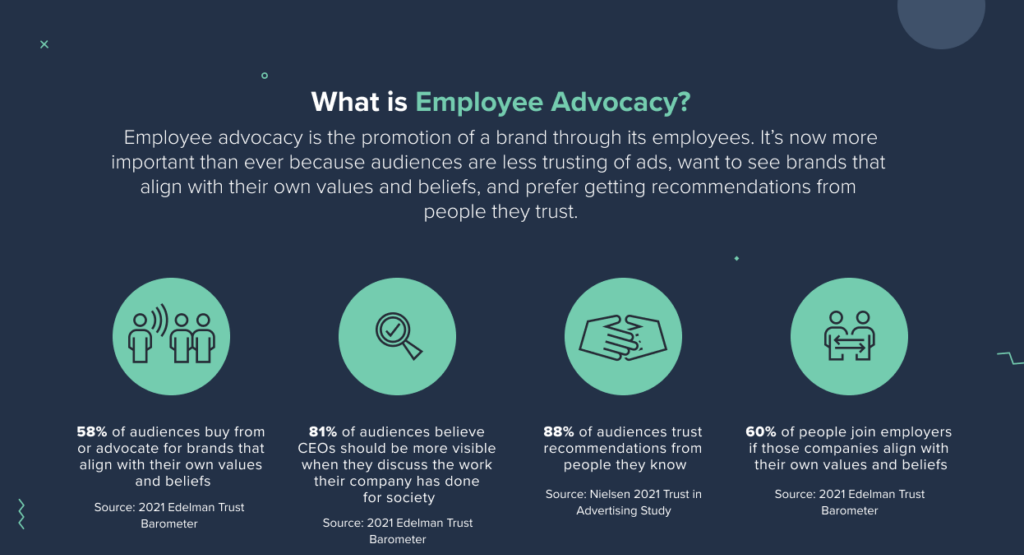
Engage your employees in building a positive online reputation. Encourage them to share positive experiences and contribute to the brand’s online presence. Employee testimonials and participation in online discussions can enhance the overall reputation of your business.
There is no harm in asking your employees to provide honest feedback about your brand or offering. Since they watch customers closely, they too can form an honest opinion about your product or service.
8. SEO Optimization
Optimize your online content for search engines. Positive reviews, testimonials, and consistent branding increase search engine rankings. Incorporate relevant keywords to enhance your brand’s visibility in search results.
Search engines wish to provide the most relevant website content for the user’s query. Adding a human element to your website with active ORM, customer testimonials, reviews and product benefits to users helps search engines generate a relevancy for the search user’s query.
9. Monitor Competitor Activities
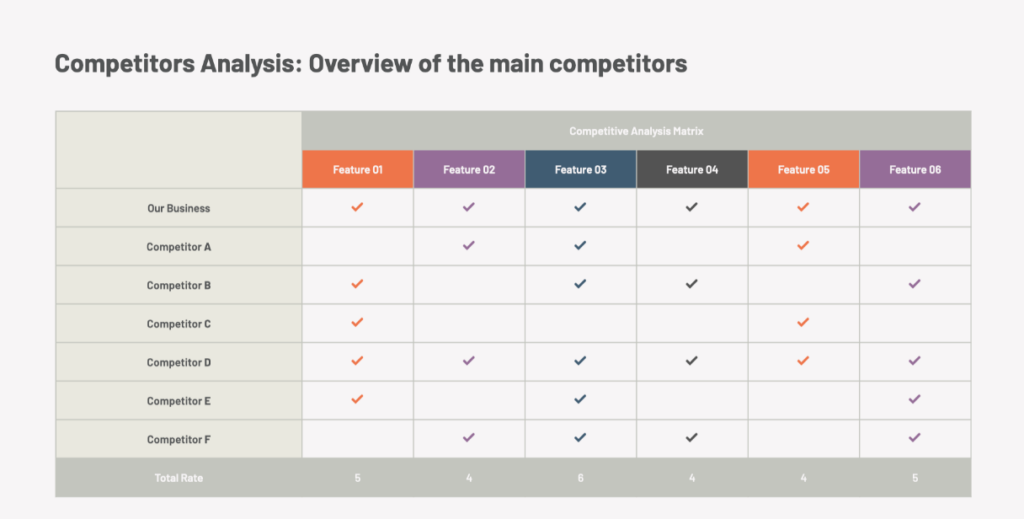
Watch your competitors’ online reputation strategies. Understand what works well for them and adapt those strategies to suit your brand. Learning from the successes and challenges of others can enhance your reputation management approach.
Social listening with tools allows you to learn how your rivals are doing differently. Tools like Sprout Social create reports on your competitors from multiple angles and data points.
10. Seek Professional Assistance
Consider partnering with professionals or utilizing online reputation management services. These experts can provide valuable insights, tools, and strategies to navigate the complex landscape of online reputation management effectively.
Understanding the Relationship Between ORM and SEO
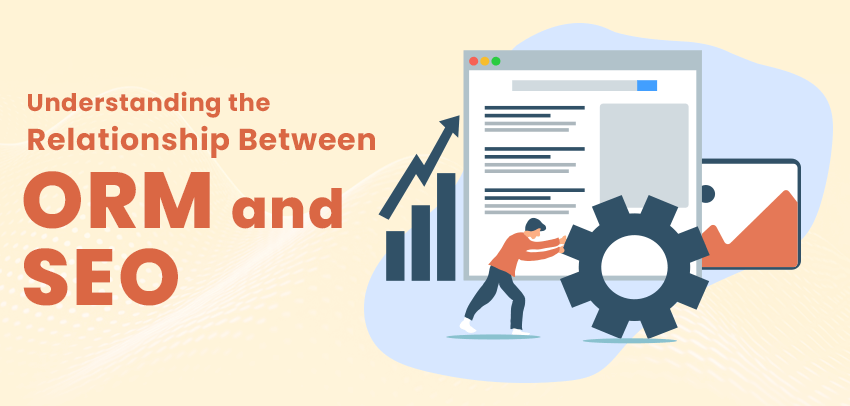
The connection between Online Reputation Management (ORM) and Search Engine Optimization (SEO) is intricate and mutually influential. Here’s a breakdown of how these two vital aspects of digital presence are interconnected.
1. Search Engine Rankings

A positive online reputation contributes to higher search engine rankings. Search engines, like Google, consider the overall sentiment surrounding a brand, including online reviews and social media presence. A positive reputation can result in higher organic rankings, increasing your business’s visibility to potential customers.
2. Content Quality and Keywords
Online reviews often contain keywords related to your business. These keywords can enhance your SEO strategy when associated with a positive sentiment. Positive reviews and testimonials create high-quality, relevant content that aligns with search engine algorithms.
3. Click-Through Rates (CTR)

A positive online reputation can lead to higher click-through rates in search results. Users who see positive reviews and a reputable brand are likely to click on your website. Increased CTR tells search engines that your content is relevant and valuable, influencing your search rankings positively.
4. User Engagement Signals
Search engines consider user engagement signals, such as the time spent on a website and the interaction with content. A positive online reputation attracts users who are more likely to engage with your site. Increased engagement can indirectly boost your SEO by signaling search engines that your content is valuable and relevant.
5. Local SEO Impact
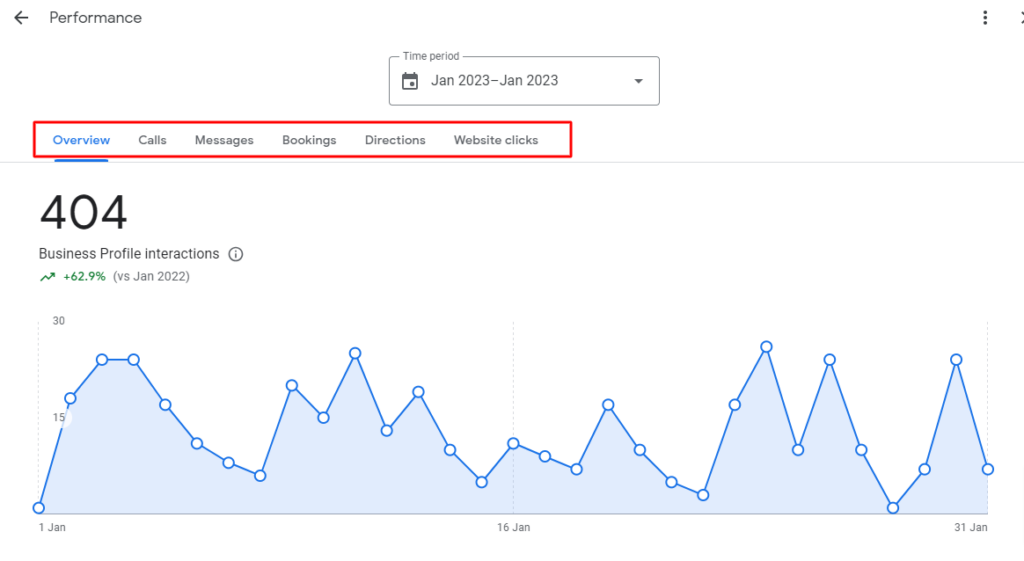
Online reviews, particularly on platforms like Google My Business, are significant in local SEO. Positive reviews enhance your local search visibility, making your business more prominent in local search results. It is crucial for attracting nearby customers.
6. Backlink Opportunities
A positive online reputation helps increase backlink opportunities. Other websites are more likely to link to your content when your brand is well-regarded. Quality backlinks are key in SEO, influencing search engine algorithms and increasing rankings.
7. Social Media Signals

Social media presence and activity contribute to online reputation and impact SEO. Content shared on social media can generate engagement, backlinks, and brand mentions—all favorable signals to search engines.
8. Online Presence Consistency
Maintaining a consistent brand image across various online platforms, a fundamental aspect of reputation management also contributes to SEO. Search engines appreciate uniformity and consider it a positive factor when determining rankings.
The connection between ORM and SEO is symbiotic. A positive online reputation enhances your brand’s image and directly impacts your search engine visibility and rankings.
Conclusion
In the digital age, where every online interaction shapes your brand’s narrative, local reputation marketing is a cornerstone of success. Online reputation management is not just a reactive measure to address negative comments; it’s a proactive strategy that contributes to building trust, attracting customers, and sustaining long-term success in the digital marketplace.
Proactively managing your brand’s image, engaging with customers, and understanding the interconnectedness of ORM and SEO are key components in navigating the dynamic landscape of the digital marketplace. Embrace the power of reputation marketing, and watch your brand survive and thrive in the vast online world.




